Review: The Outer Worlds
28th October 2019
Credit: Obsidian Entertainment
I’m going to start this review with a statement of fact.
The Outer Worlds is my pick for 2019’s game of the year award.
The fact that I feel comfortable writing that, despite this year still having two months to go, should tell you all you need to know about how highly I rate Obsidian Entertainment’s new interstellar role-playing game.
Then again, it could be said that when it came to me, Obsidian were already preaching to the converted, given that their last foray into the RPG genre, 2010’s Fallout New Vegas, is pretty much my favourite game of all time. That said, the fact I enjoyed New Vegas so much could easily have had the opposite effect on my opinion of The Outer Worlds, had it failed to live up to New Vegas’ lofty standards. Fortunately, it did.
The central premise of the Outer Worlds’ story is essentially based around the idea that if our species ever leaves Earth to colonise another planet, one of the first buildings to be erected would no doubt be a McDonald’s. Instead of countries jetting off to colonise deep space, corporations have picked up the mantle and taken over the task of settling space’s frontier, including the Halcyon Colony, in which the game is set. Naturally, this means the game’s story involves a lot of corporate factions, who own most of the game’s various settlements and even, in many cases, the people in them. There are occasions where this leads to what is otherwise a very colourful and upbeat game, touching upon very gritty and culturally relevant political themes. A good example of this is seen during an early side quest which involves going around shaking down residents of a town for money to pay their corporation to buy their plot in the town’s graveyard. These critiques of late-stage capitalism are a central part of the game’s quota-fuelled dystopian world, serving as reminders that despite the lovable characters, vibrant scenery and goofy moon-man costumes, Halcyon isn’t a place you’d want to live in reality.
However, The Outer Worlds isn’t a depressing game, largely due to the lovable cast of characters that inhabit its many planets. From slogan-spewing model corporate employees, to idealistic revolutionaries who’ve rejected the corporate lifestyle and pragmatic, battle-hardened mercenaries who’re just seeking to make a buck out of the chaos, each man or woman you meet during your travels has their own unique personality and voice. This makes Halcyon an easy place to feel immersed in, as you travel the galaxy either alone, or with one or two of the game’s companions. You will want to take those companions with you too, as the little band of brothers and sisters you can recruit serve as much more than just pack mules. Each companion has their own personality, quest-line and unique interactions with the people you’ll meet around Halcyon. They’ll periodically join in on your conversations, offering you wisdom on topics they’re versed in and a range of witty retorts. This makes it truly feel like you’re exploring the galaxy as a group, rather than just one person with a couple of people who carry their bags.
One thing which really struck me about the characters of The Outer Worlds was the abundance of strong female characters you meet in Halcyon, which include companions and faction leaders. This is something to be commended in an industry which often tends to focus more on male characters and is another aspect that makes The Outer Worlds stand out from the crowd. The game also handles LGBT issues with aplomb, with one of the companions, Parvati, expressing interest in another female mechanic early in the game. This leads to you helping her to overcome her struggles with social anxiety and physical affection, on the road to asking the other mechanic out on date. This is extremely well-written and feels realistic and not forced, while still being emotive and interesting.
Another aspect of The Outer Worlds which is very well-executed is the world-building. When news first dropped that the game would feature a number of smaller open-world spaces on planets, rather than a traditional all-in-one open world like New Vegas, I’ll admit that I was skeptical. However, this strategy fits the game perfectly, allowing it to focus around a number of hand-picked and fleshed out locales, which you travel between using your spaceship, the Unreliable. What marks this as a successful construction, at least in my mind, is the fact that it doesn’t feel limiting. Instead it creates a world that, while being more linear, neatly unfolds itself as you get into the game and offers more with each hour. I’d compare it to a more expansive version of CD Project Red’s The Witcher 2, which also employed this kind of structure, offering new places to explore as you progressed, rather than right from the word go.
The combat that links each mission and location together is as well put together as the rest of the game, with a range of weaponry that you can personalise as you please, simply by tailoring your character to it through the skills you select at the start or as you level up. There’s an expansive range of skills to choose from, including combat skills, dialogue-based skills and even tech based skills like science and engineering. this gives you the tools to create any character you like, rather than streamlining you into one of six or seven playstyles. All of these skills are useful too, giving you different ways to go about missions or solve problems, something which is hugely important in a game with branching narratives and lots of great choice and consequences. There are few games that could make me question why I didn’t pick a random skill like engineering, just because it would have made one quest so much easier. This one did.
The choice and consequence, much like New Vegas, is an area where The Outer Worlds really comes into its own. One of the first major quests you complete has you choose whether to turn off the power in either a corporate controlled town full of workers or in the camp of a group of settlers who’ve decided to reject the corporate life, in order to get a part for your ship. Whomever’s power you choose to turn off will end up either dead or forced to move on against their will, but you’ve got to choose one. Then, once you’ve chosen, you’ve got to walk back through the place you’ve betrayed to collect your part, which they aren’t exactly happy about letting you take. That is an RPG at its finest. You have to make decisions, and they do mean something for those around you.
Above all, The Outer Worlds is what an RPG should be, a polished game with an engaging world that you can influence through your actions and the type of character you’ve built. It’s a game in which you choose whether to be a moralistic pacifist, a rebellious revolutionary, a money-hungry corporate mercenary or something else entirely, but regardless of what you choose to do when you get to Halcyon, you should choose to pick up The Outer Worlds, because you certainly won’t regret it.


